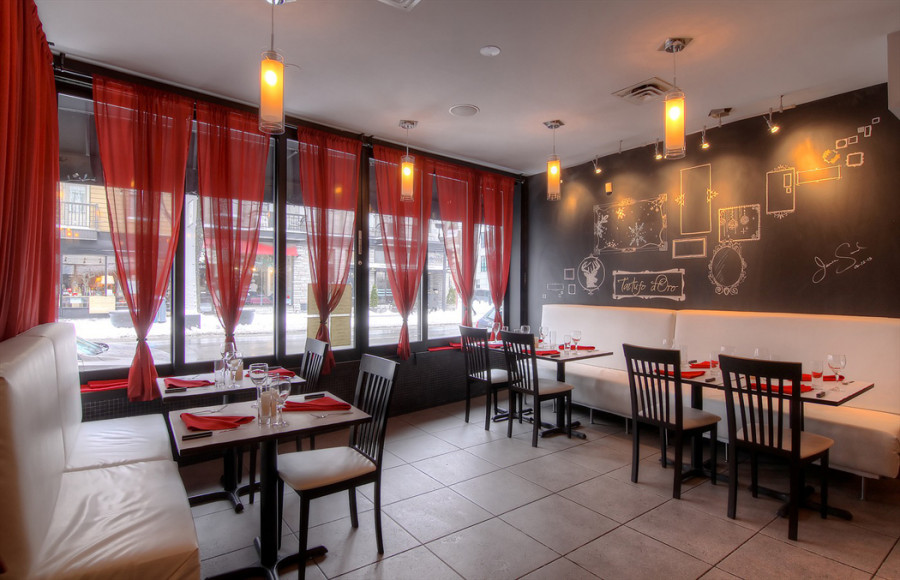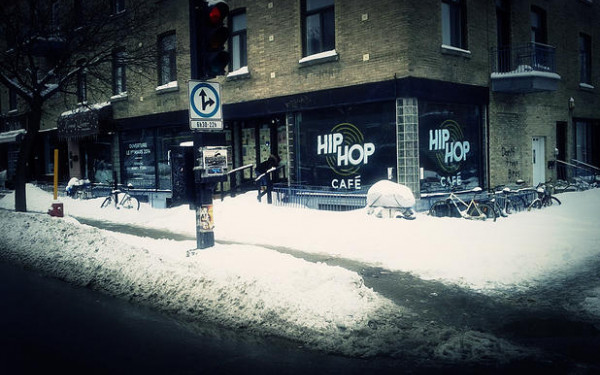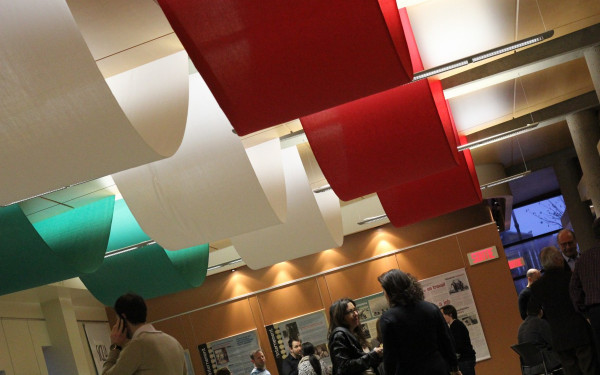Another One Bites the Crust
Inside Montreal’s Booming Restaurant Scene—and the Struggle of the Up-and-Comers
What’s for dinner? If you’re walking the pizza- and poutine-paved streets of Montreal, there are endless answers to that question.
There’s a café catering to every craving. There are establishments, old and new, looking to serve up supper, and competition is stiff.
From the Crust Up
So what does it take for a fledgling business to stay above ice water with lemon in a city saturated in resto-bars, patisseries and fine dining experiences? What factors decide whether a new establishment will survive to serve another day or be forced to throw in the apron and emblazon darkened windows with the dreaded red “For Sale” sign?
“Get back to me in 10 years, and I’ll let you know,” said Brian Szubiak, head chef of Tartufo d’Oro, an Italian restaurant he opened with his brother Kevin in November 2013.
Tartufo d’Oro is located in the heart of Little Italy, where eateries with encyclopedia-length menus dish up standards like veal parmesan and fettuccini alfredo. It was something the Szubiak brothers decided to avoid when planning their menu.
“The vision was [taking] something that we knew—Italian cuisine—and doing it in a way that we found fun and exciting, and that you don’t really find anywhere else,” said Brian.
Besides the curious delights on their menu, which includes riffs on traditional fare such as ravioli stuffed with sweet potato and carrot, pesto sauce made of peppery arugula, and a Nutella and amaretto cookie gelato, the two entrepreneurs insisted that everything had to be done with a meticulous care from the crust up.
“We make all our own pasta, we make our own focaccia,” said Kevin over the whirring clicks as Brian worked the pasta maker in the background, prepping for dinner service.
“We make things that meet our ideology—things that we know, ravioli and pesto, and sort of [turn them] into something a little more creative. We don’t find it interesting to recycle the last 30 years,” he said.
Changing the red sauce and pizza landscape of Little Italy is no easy task, but the brothers are hoping that what sets them apart is what will keep them as a fresh, successful and relevant institution for years to come.
Some Chess with that Espresso?
Another up-and-coming business looking to shake pretense is Café Chimera, a board game store and café hybrid in N.D.G.
Owner and operator Philip Campbell had already been running a game store when he and a business partner decided to move it to a larger location and get into the business of slinging java alongside the games, creating a warm atmosphere where people could come to play and socialize over quality coffee.
Campbell’s own foray into the realm of coffee is recent. He didn’t even start drinking it until he discovered Third Wave coffee, a movement focused on high-quality beans and developing relationships between growers, roasters and buyers—the microbrewery movement of the caffeine world.
“I didn’t actually really drink coffee until about two years ago,” he said. “I didn’t know there was good coffee.”
Thus, one of the prime goals of Chimera is to break down the public’s preconceived notions about what constitutes a good cup of joe by keeping standards of quality high. In Third Wave coffee, it’s common practice to compare the subtle flavours or nuances in a roast, the way one might at a wine tasting. It’s a concept that often doesn’t translate to a large proportion of the public.
“Originally the baristas would write the flavour notes of the coffee and people thought that meant flavoured coffee. They would write ‘rhubarb’ and people would be like, ‘Rhubarb-flavoured coffee? That sounds disgusting,’” said Campbell.
Campbell’s philosophy on education may extend to the public, but it begins with his staff. Many of Café Chimera’s baristas were sent to courses to learn about how coffee is made.
However, a high standard doesn’t necessarily mean high customer traffic. Café Chimera opened in September and has seen its share of struggles since then.
“We’re still in the process of establishing ourselves,” said Campbell. “We went through a lot of trouble starting up here.
“Certain spending got out of control,” he continued. “You have to pay people, but then [you] have no money to buy more inventory, and that was our issue early on.”
Cutbacks on hours and staff are one solution to such a problem, but Campbell sees some of the standards implemented by Revenue Québec as a large contributor to the struggle of new, independent businesses.
Specifically, he takes issue with the SRM, or Sales Recording Module, a device attached to cash registers in restaurants and cafés to ensure that restaurant owners do not take liberties when charging clients. It’s a noble goal with some drawbacks, including the large cost it can incur for struggling establishments who may not be able to afford it.
“The boxes are $600 to $1,000 depending on if you get a new one or a used one. Then you have to pay someone to install it,” Campbell said.
Such costs might only be the beginning when it comes to the SRM.
“There’s people who bought an entirely new [point of sale] system, and then this law came into place and they had to throw [them] out, because they didn’t work with the SRM,” he said.
These major costs are a hindrance to independent businesses struggling to survive, whereas they’re only pocket change to the large chain restaurants in Quebec. Strictly speaking, the law might keep business owners honest, but it could very well shut them down while big business thrives.
Standing the Heat
A challenge shared by both the Szubiak brothers and Campbell has been handling the red tape that comes with opening a new business.
“[A challenge] has been finding out all the rules that you don’t really think about, like permits, what you can do in terms of building,” said Kevin. “You need contract workers on it, you can’t just start mucking around.”
On the other end of the scale, Campbell believes some of the food safety laws need revising.
“We have to contract out an industrial kitchen to do certain things […] because we don’t have three large sinks,” he said. “We have a sanitizer and everything, [while] some cafés are under a dépanneur licence [and] don’t have to adhere to certain food safety protocol.”
Perhaps these are necessary evils, but they are also hurdles for busy owners navigating multiple roles. On top of handling administrative affairs, Kevin has been learning food preparation from his brother in order to help out in the kitchen, while Campbell multitasks between café and game store.
Both Tartufo d’Oro and Café Chimera lean on a close-knit staff to create a warm, knowledgeable atmosphere they hope will be welcome and appealing to customers. They’re both thinking big while keeping it small for now.
“[We] hire people that would mesh well with the rest of our family. So it’s been a very warm atmosphere thus far,” said Kevin.
In the meantime, it seems that all either establishment can do is keep pushing forward with sights set on the future, while staying true to their visions.
Brian cited three key things to focus on to increase their chance of success: “The quality of the food, the quality of the service and a clear direction or concept […] to present to the public.”
In a few months, the brothers have plans to update Tartufo d’Oro’s menu, to keep themselves and customers interested.
“Every few months we’re looking to find something new, something more,” said Kevin. “We’re looking to always do something that’s fresh and innovative.”
One can only hope that the public has an appetite for such food for thought.

_900_600_90.jpg)






.WEB_600_375_90_s_c1.jpg)